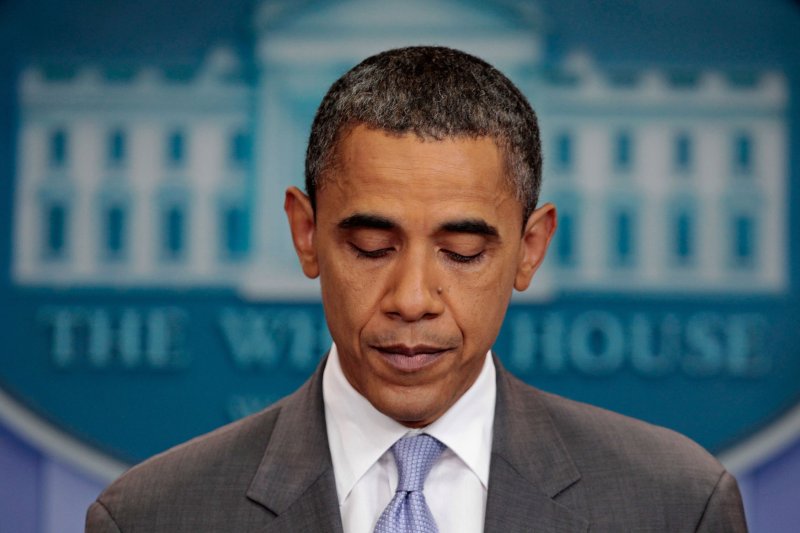1 of 4 | U.S. President Barack Obama speaks on the debt limit impasse from the briefing room of the White House on July 31, 2011 in Washington, D.C. Obama indicated that he and Republican members of Congress have reached a compromise to solve the debt limit impasse prior to the August 2 deadline. UPI/Somodevilla/Pool |
License Photo
WASHINGTON, Aug. 1 (UPI) -- The U.S. House Monday passed the deficit reduction bill and sent it to the Senate for consideration.
The vote was 269-161 with 95 Democrats joining 174 Republicans in voting in favor of the measure, and 95 Democrats voting with 66 Republicans against it.
The Senate is to vote on the measure Tuesday.
In a huge surprise, the "yes" votes included one cast by Rep. Gabrielle Giffords, D-Ariz., who is recovering from a bullet wound to her head, suffered during a shooting spree at a constituents' gathering in Tucson in January.
Giffords, in her first appearance in Capitol Hill since being wounded, waved to those gathered in the House chamber for the historic vote to avoid the risk of a first-ever default by the U.S. government and blew them kisses. She was greeted with a standing ovation.
After the vote, House Minority Leader Nancy Pelosi, D-Calif., said Giffords' "presence here in the chamber … brings honor to this chamber."
The debt reduction plan would cut deficits by at least $2.1 trillion over 10 years, the Congressional Budget Office said in a letter sent to House Speaker John Boehner, R-Ohio.
The CBO "estimates that the legislation … would reduce budget deficits by $917 billion between 2012 and 2021," in up-front savings and another $1.2 trillion in savings coming from work done by a special bipartisan, bicameral committee, the letter read.
The non-partisan office's review of the framework came a day after President Barack Obama and congressional leaders reached agreement to raise the federal debt limit that includes steep spending cuts but no new taxes, breaking an impasse that flung the country toward default. Tuesday is deadline for a deal to be struck before the country loses its borrowing authority and risks the possibility of defaulting on its obligations.
The agreement would raise the $14.3 trillion debt limit in two stages by as much as $2.4 trillion.
Senate Majority Leader Harry Reid's hope of quick passage in the Senate could threatened by South Carolina Republicans Lindsey Graham and Jim DeMint, who said they would not vote for the bill, The Hill reported.
"I'm not going to tell Americans that we're doing everything when we're not," he said. "We're planning on adding another $10 trillion in debt."
DeMint said he will not permit a Senate vote until he and his staff have reviewed the measure thoroughly.
"I'll be asking for the right to read it and go through it. That takes a while. They need to get us the bill so that we can print it out and start going through it," DeMint told The Hill. "This idea that you have to pass it to find out what's in it doesn't work. I'd like to read it to find out what's in it, and I think a number of Republicans feel that way."
Graham, in a statement, said he couldn't "in good conscience" vote for the bill.
"Simply stated, it locks us into more debt, bigger government and most devastating of all, a weakened defense infrastructure at a time when we face growing threats," Graham said.
Reid said neither side got what it wanted in the legislation, "but it's the nature of compromise."
He said he was "confident we did the right thing for the American people. The solution cuts the deficit now, lays the groundwork for Congress to do much better work in the months ahead, and clears the way for us to look up at the bright sunshine and get rid of the clouds of default that have been hanging over our country for far too long. But our work is far from done."
The framework would establish a joint congressional committee to propose further deficit reduction, with a goal of achieving at least $1.5 trillion in savings during the next decade. If the panel cannot develop the savings plan, a series of what Obama and congressional leaders called cuts "painful" to both parties would be triggered.
"In addition, legislation originating with the joint select committee, or the automatic reductions in spending that would occur in the absence of such legislation, would reduce deficits by at least $1.2 trillion over the 10-year period," the CBO report said. "Therefore, the deficit reduction stemming from this legislation would total at least $2.1 trillion over the 2012–2021 period.















